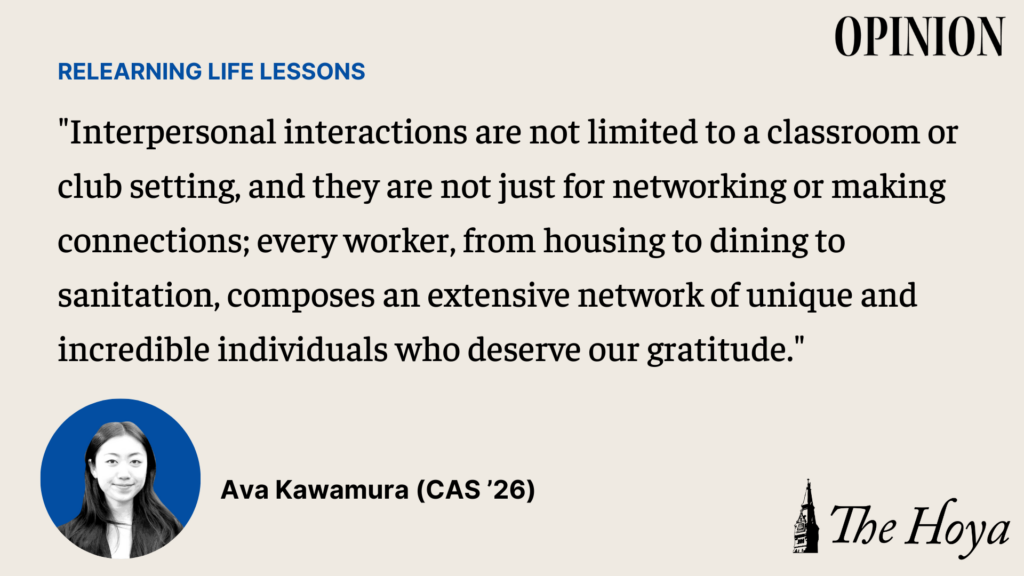These days, I go to Whisk for more than just tea.
As an avid, perhaps slightly obsessed tea drinker, I quickly became a regular at Whisk, stopping by after breakfast, in between classes and on the way to Lauinger Library for an afternoon study session. Last semester, I started going nearly four or five times a day, trying a different flavor each week until I found my monthly favorite.
The Whisk staff began to remember me with these visits, reaching for a large cup and writing my order on the side of it before I could tell them what I wanted. I asked how to pronounce their names so that I could personally thank them each visit. Our previously 10-second interactions blossomed into longer exchanges of “How are you?,” “Any weekend plans?” and “Missed you yesterday!”
As our conversations expanded, so did our understanding of each other. I began to hear more about who they really are — from their hopes to spend time with family, to their interactions with other students, to their excitement for the approaching Friday afternoon. My trips to Whisk became highly anticipated parts of my day, and the workers became beacons of warmth and laughter in my otherwise overwhelming student life. This semester, our camaraderie has only grown; they continue to joke about my excessive tea consumption, even drawing hearts on my cup.
The Whisk staff is just one example of our campus’ backbone: the essential workers that are often overlooked. The person who plates your food at the dining hall, the one who cleans your bathroom and the facilities worker who responds to your work order are all critical members of Georgetown University’s community. Yet, in their interactions with these workers, many students fail to even say “thank you,” which is illustrative of the Georgetown community’s often blatant disregard for campus staff.
As members of a university that prides itself on being a “Community in Diversity” fostering “People for Others,” Georgetown students should recognize their interdependence with everyone on campus. Interpersonal interactions are not limited to a classroom or club setting, and they are not just for networking or making connections; every worker, from housing to dining to sanitation, composes an extensive network of unique and incredible individuals who deserve our gratitude.
Expressing thanks is the bare minimum. Every time I run into a campus staff member –– whether it be at Whisk or in my dorm’s laundry room –– “thank you” can only begin to express my full appreciation.
Over time, I have grown increasingly disheartened while overhearing peers complain about staff members. The other day, I heard a student mocking a Leo J. O’Donovan Dining Hall’s worker who had come off as “unpleasant.” As they imitated the worker’s voice and movements, their friends began to laugh. Their insulting behavior reveals a distressing attitude of ignorance and lack of gratitude for some of the most underappreciated members of the Georgetown community.
Georgetown students often overlook the humanity of workers. It is unacceptable for individuals to either ignore or unjustly criticize Georgetown’s hardworking staff, especially when they fail to thank them for their efforts in the first place.
Ultimately, university students should actively take steps toward expressing their gratitude. Whether it be complimenting workers or supporting them by completing a positive feedback survey, students have an important duty to acknowledge the hard work that Georgetown’s staff provides.
I was moved by the new “appreciation board” near the dish return station in Leo’s, where some students wrote notes recognizing their favorite staff members. Although there are only a handful of praises at the moment, this is a promising first step toward encouraging university students to extend their thanks to staff beyond just brief interactions.
At the end of the day, saying “thank you” truly goes a long way, but it’s only a first step toward expressing gratitude. Next time you find yourself face-to-face with a Leo’s employee or cleaning staff member, think about asking them, “How are you?” Appreciation can take a more meaningful form through conversation, interest and a willingness to reach out. Acknowledge those who support you in every facet of your life, regardless of whether or not their influence on your life is explicitly apparent to you.
Ava Kawamura is a first-year student in the College of Arts & Sciences. Relearning Life Lessons is published every third Friday.














